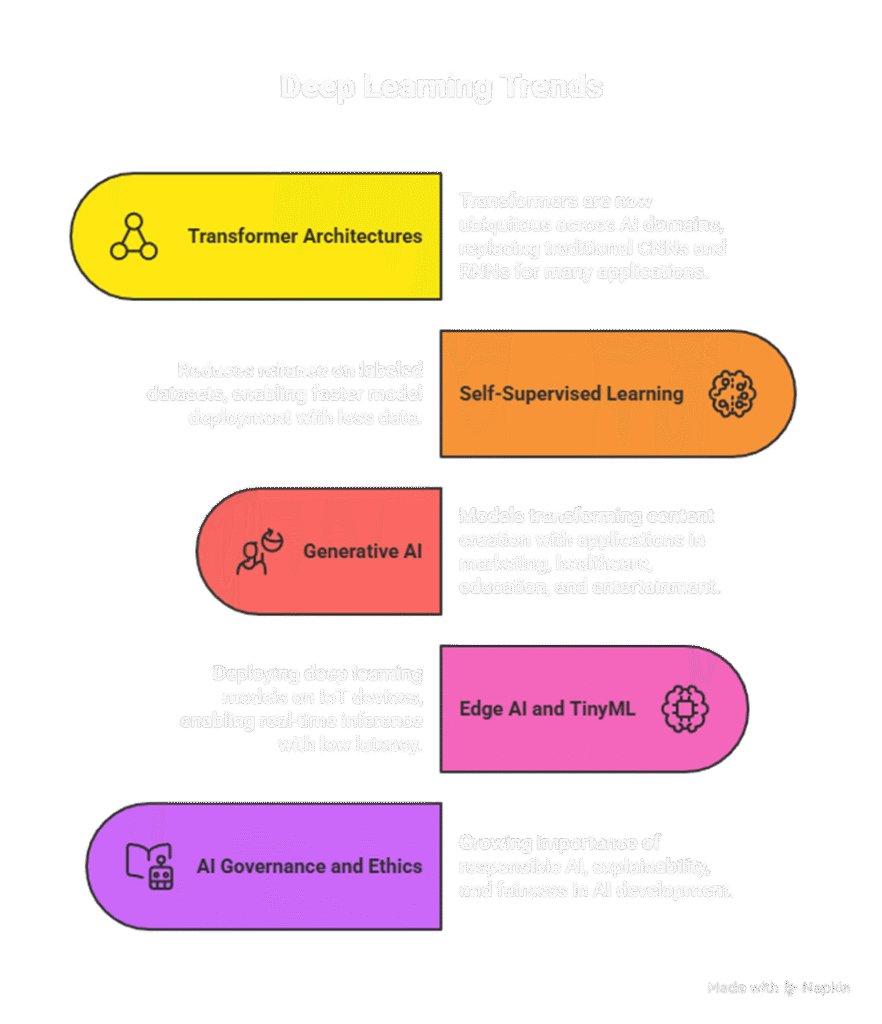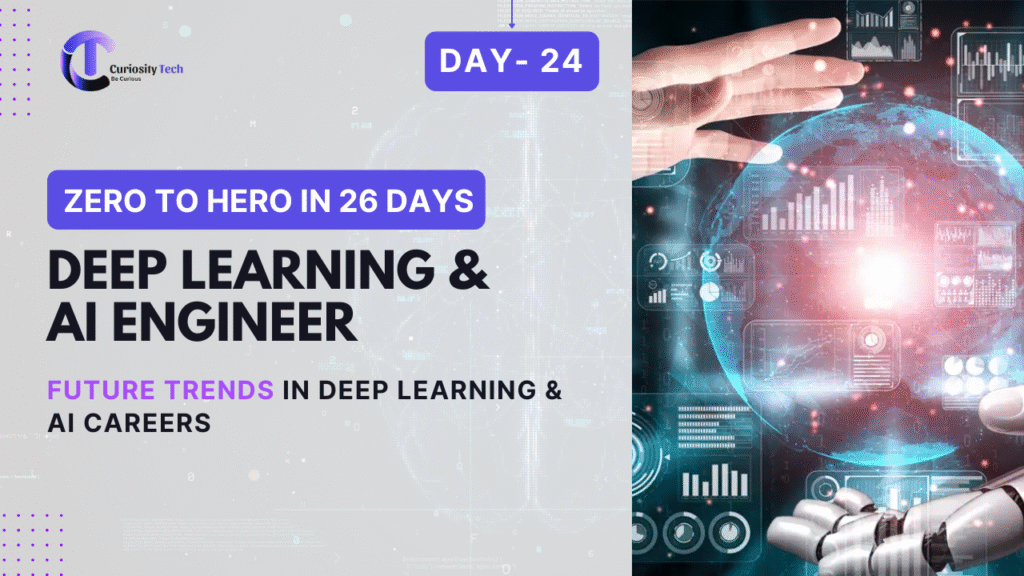Introduction
The field of Deep Learning and AI is evolving at an unprecedented pace. Staying ahead requires understanding emerging trends, adapting skill sets, and anticipating future career opportunities.
At CuriosityTech.in, learners in Nagpur are trained to analyze industry trends, adopt next-generation AI tools, and prepare for careers that may not yet exist, ensuring they remain relevant and competitive in 2025 and beyond.
1. Emerging Trends in Deep Learning
Transformer Architectures Beyond NLP
- Vision transformers (ViTs) in computer vision
- Multimodal transformers integrating text, image, and audio
- Generative AI transformers for image, video, and code generation
Observation: Transformers are now ubiquitous across AI domains, replacing traditional CNNs and RNNs for many applications.
Self-Supervised & Unsupervised Learning
- Reduces reliance on labeled datasets
- Techniques like SimCLR, BYOL, DINO for computer vision
- Contrastive and masked language/image modeling for multimodal data
Impact: Enables faster model deployment with less data, critical for startups and large-scale AI projects.
Generative AI
- Models like ChatGPT, DALL·E, Stable Diffusion transforming content creation
- Applications: Marketing, healthcare simulations, educational content, entertainment
- Generative AI integration in software development, design, and robotics
CuriosityTech Insight: Students explore hands-on generative AI projects, learning how to combine creativity with technical skills.
Edge AI and TinyML
- Deploying deep learning models on IoT devices, drones, and mobile hardware
- Techniques: Model quantization, pruning, knowledge distillation
- Enables real-time inference with low latency
Career Implication: Engineers skilled in edge deployment and optimized architectures will be in high demand.
AI Governance and Ethics
- Growing importance of responsible AI, explainability, and fairness
- Tools for model interpretability and bias detection becoming industry standards
- Compliance with emerging AI regulations worldwide
Observation: Engineers must combine technical skills with ethical awareness to build trusted AI systems.

2. Future Career Roles in AI
| Role | Key Skills | Industries |
| AI Research Scientist | Transformers, self-supervised learning, generative AI | Tech, Academia, R&D labs |
| AI Product Engineer | Deployment, MLOps, cloud AI | Startups, Enterprise, Cloud Platforms |
| Edge AI Engineer | Model optimization, TinyML, embedded systems | IoT, Robotics, Automotive |
| AI Ethics Specialist | Fairness, interpretability, governance | Finance, Healthcare, Government |
| Robotics AI Engineer | Perception, RL, motion planning | Industrial Automation, Drones, Autonomous Vehicles |
CuriosityTech Example: Learners are exposed to full-stack AI projects, from data preprocessing to deployment and monitoring, aligning with future industry needs.
3. Skills Roadmap for 2025
Foundation Skills
- Python, Linear Algebra, Probability, Statistics
- Basic ML algorithms (Regression, Classification, Clustering)
Intermediate Skills
- Deep Learning frameworks: TensorFlow, PyTorch
- CNNs, RNNs, LSTMs, GANs
- NLP basics and Transformers
Advanced Skills
- Self-supervised learning, multi-modal transformers
- Generative AI (text, image, video)
- Edge AI, TinyML, model optimization
Professional Skills
- MLOps, cloud deployment, CI/CD pipelines
- AI ethics, explainability, bias mitigation
- Domain-specific expertise (healthcare, robotics, finance)

CuriosityTech Tip: Combining technical mastery with domain knowledge ensures high employability and future-proof careers.
4. Human Story
A learner at CuriosityTech started with CNN-based image classification, progressed to multimodal transformer projects, and deployed models on Raspberry Pi for edge inference. By 2025, they were ready for roles in autonomous drones and industrial automation, demonstrating the power of structured skill progression aligned with emerging trends.
5. Practical Career Advice
- Stay Updated: Follow AI conferences, research papers, and industry news
- Hands-On Projects: Implement end-to-end pipelines using cloud, edge, and multi-modal AI
- Certifications & Portfolio: Validate skills with globally recognized certifications and showcase projects
- Networking: Engage with professional communities and AI forums
- Ethics & Compliance: Develop AI systems responsibly to meet regulatory standards
Observation: CuriosityTech learners who follow this approach gain early access to advanced AI roles, often becoming team leads or specialists in emerging domains.
Conclusion
The future of deep learning and AI careers is defined by transformers, self-supervised learning, generative AI, edge deployment, and ethical AI practices. At CuriosityTech.in, learners gain hands-on exposure, industry insights, and structured skill pathways, ensuring they are well-prepared to excel in 2025 and beyond in rapidly evolving AI fields.



